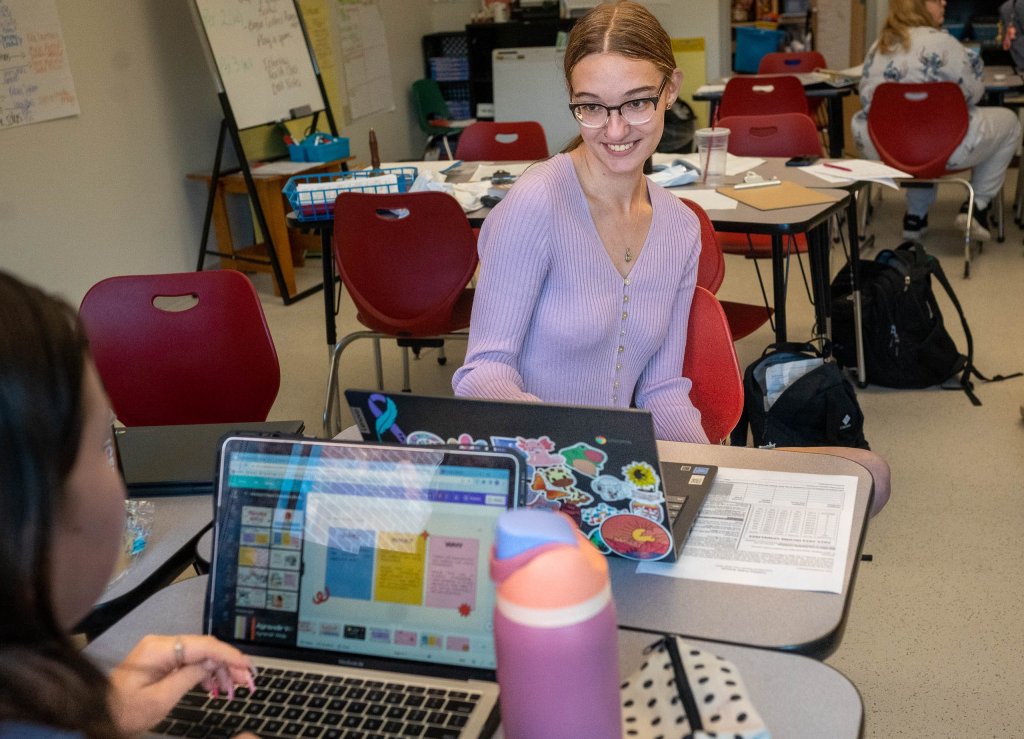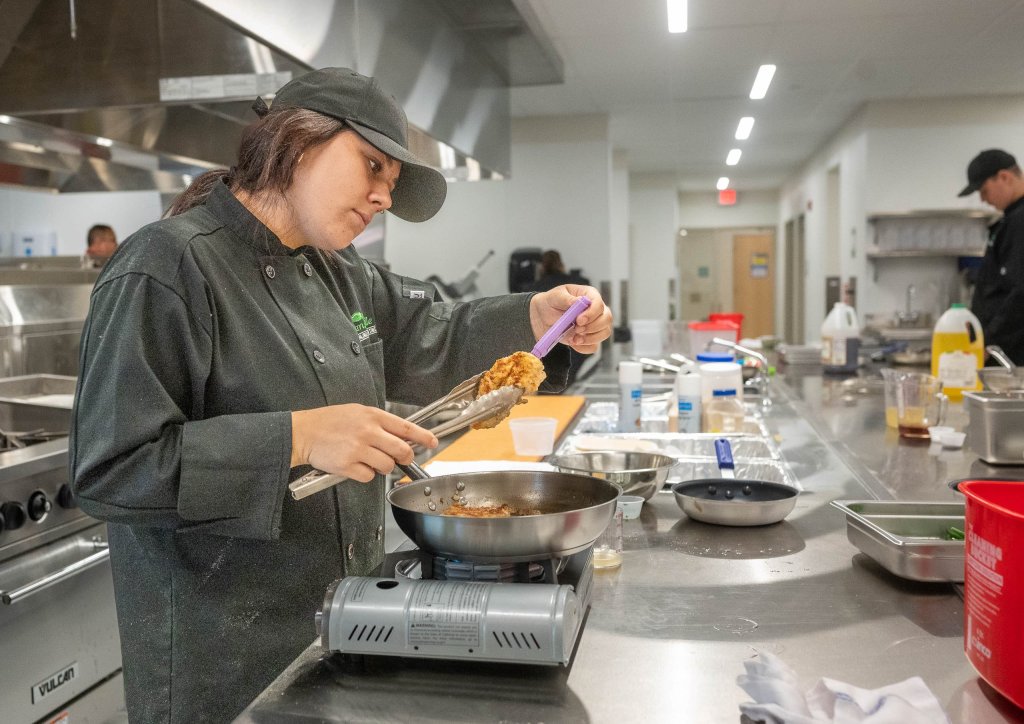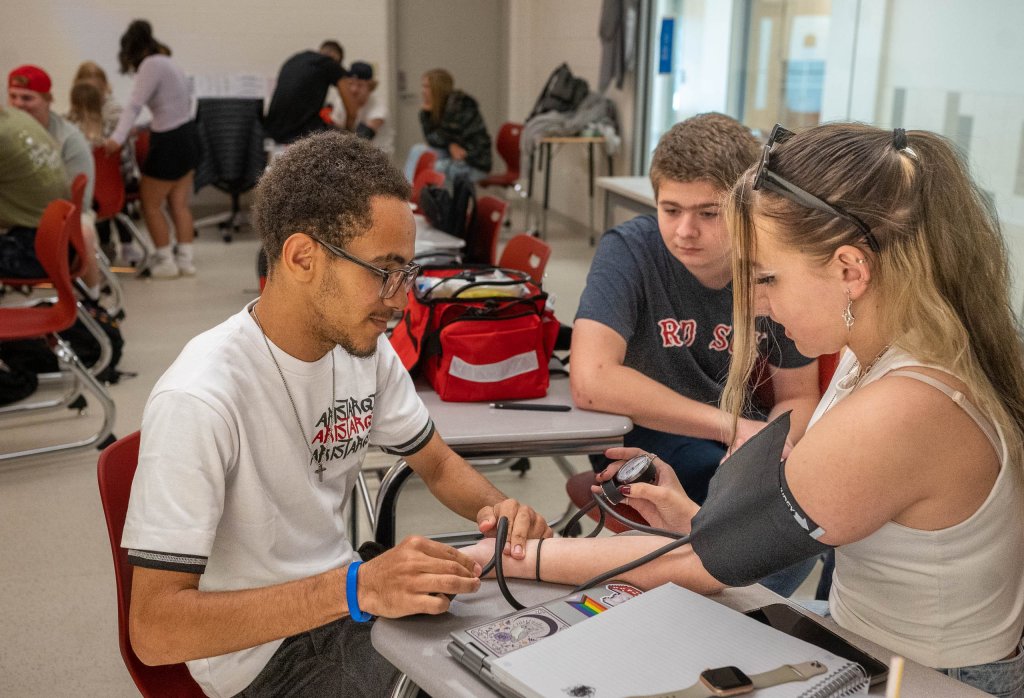AUBURN — Whether students are flipping chicken over a steaming pan, taking each other’s blood pressure, sitting around a table forming lesson plans for 4-year-olds or considering how cosmetologists communicate best with clients, there are multiple spaces at the new Edward Little High School to support Lewiston Regional Technical Center’s new, expanded or moved programs.
Most of the spaces are set up along a couple of large corridors on the first floor of the new building, giving it more of a main street appearance, LRTC Director Rob Callahan said. “It was designed that way on purpose,” he said.
LRTC serves Edward Little High School, Lewiston High School, Lisbon High School, Leavitt Area High School in Turner, Oak Hill High School in Wales and Poland Regional High School. Until this year, it ran all of its programs out of the Lewiston High School campus. Edward Little High School is now a second site where several programs are offered.
Though the technical center now has a dual-campus model, Lewiston senior Skylar Gaudette, 17, said it still feels like one school and not two.

Skylar Gaudette, 17, chats with a classmate Thursday in her cosmetology class at Edward Little High School. Lewiston Regional Technical Center classes are now being offered at the new Edward Little High School. Students taking cosmetology classes get credit for the hours of courses taken at the high school, but still must go to cosmetology school to complete their course work. Andree Kehn/Sun Journal
She is in one of LRTC’s inaugural cosmetology program classes, allowing her to gain hours she can use toward getting her cosmetology license after she graduates. She likes how modern the new cosmetology classroom at Edward Little looks, she said.
The space for the program is set up to look much like a real salon, with floor-length mirrors, carts of supplies and a front counter. Students will learn the basics of hairdressing, along with how to give manicures and pedicures.
LRTC is only the fifth technical center in the state to offer a cosmetology program, according to Callahan. It is just one of several new programs the technical center is offering at the new Edward Little High School.
When Callahan first learned that Auburn was moving forward with plans for a new high school, he contacted school department officials to see if they would be willing to build spaces for new and existing LRTC programs, he said.
The technical center in Lewiston has been experiencing high demand for all its programs, requiring it to turn away many students each year, he said. He also noticed that a lot of those students being turned away were coming from Auburn.
MEETING COMMUNITY NEED AND STUDENT INTERESTS
LRTC leaders look to community need and student interests when considering what programs to add, Callahan said. When developing new programming, they look at what industries need skilled workers and what industries students are interested in studying.
One of those industries includes emergency services, such as EMT, firefighting and law enforcement.
Poland Regional High School student Keegan Glew, 16, has wanted to work in the emergency services field since he was in fifth grade, hoping to one day become a fire marshal for the Maine State Police, he said. He also hopes to work for a volunteer fire department, “like my dad,” he said.

Hugo Lopez, left, Keegan Glew, center, and Camryn Reuling work together Thursday at Edward Little High School in Auburn to practice taking blood pressure readings in their EMT class through Lewiston Regional Technical Center. Andree Kehn/Sun Journal
After completing the EMT course, Glew will leave with a basic EMT certificate, Callahan said. LRTC is partnering with Southern Maine Community College to offer the program. Students in it are co-enrolled at the community college, making it a seamless transition if teenagers choose to pursue more EMT training at the college after graduation.
LRTC has an existing law enforcement course at Lewiston High School, but that will be moved to Edward Little next fall, sharing space with a new fire science program to be rolled out next school year, and the EMT program, Callahan said. The space also includes a forensics lab.
Fire departments are facing declining staff numbers, particularly volunteer departments, which indicates a local need for training in that field, Callahan said.
In 2020, there was a 2% increase nationally in the number of career firefighters compared to the previous year, but there was a 6% decrease in volunteer firefighter membership nationally compared to the previous year, which is the lowest figure reported yet, according to information on the National Fire Protection Association website.
LRTC is working with the Auburn Fire Department to build its program and get access to necessary equipment, Callahan said. Students in the EMS and law enforcement courses will also have access to a fire truck, ambulance and police cruiser, giving high-schoolers hands-on learning opportunities, which is considered a cornerstone of technical center education.
MORE OPPORTUNITIES FOR MORE STUDENTS
Lewiston High School junior Ameliya Doustout, 16, stood over a pan sputtering with oil while she cooked chicken at LRTC’s new culinary center at Edward Little High School in mid-September. It is exactly the type of hands-on experience she does not get in a more traditional classroom setting.

Ameliya Doustout, 16, tests the temperature on a piece of chicken destined to be a part of a chicken marsala dish Thursday at an introductory culinary arts class at Edward Little High School through Lewiston Regional Technical Center. It is one of several courses now being offered by LRTC at the new Edward Little High School. Andree Kehn/Sun Journal
The course is helping to expand her interest in cooking, though she is still not sure she wants to be a professional chef, she said. She enjoys the new experience of taking classes at a different school.
The new culinary program at Edward Little High School is an expansion of the one at the Lewiston High School campus, Callahan said. The culinary program at Lewiston High School operates out of The Green Ladle, which features a banquet hall that can fit dozens of people.
The Edward Little site houses a café that will eventually be open to teachers and administrators at certain times, along with hours during which community members can visit. Those logistics are still being worked out, Callahan said.
LRTC now offers its culinary program to 60 students at the Lewiston campus and 30 students at the Auburn campus, according to Callahan, a 50% increase in its enrollment.
Enrollment in LRTC’s education/development of children program is a full-circle moment for Lisbon senior Syriana Rich, 17, after attending the program as a child in pre-K when she was 4 years old, she said. When she completes the course she will leave with several certifications that will allow her to work at a child care facility, including a behavior health professional credential.
It will get her one step closer to becoming a child psychologist, she said. Having attention deficit hyperactivity disorder has made things a little more difficult for her in school, particularly with writing assignments, so she wants to help support children in ways that she did not feel supported growing up.
“I want to be the person I wish I had when I was younger,” she said.
Moving the program from the Lewiston campus to the Auburn campus has provided more space to operate the program, which was being taught in a smaller and more cramped space, Callahan said. There is a classroom space, observation room and a large area with cubbies and tables in which the 20 pre-K students can play and learn.
GOING BEYOND THE TRADES
Though many might think that technical schools are for students who are going right into the workforce or seeking technical certifications after high school, Callahan said that LRTC prepares students for either a college- or workforce-bound track after graduation.
Many of its students go to college and in some circumstances must seek a college degree to work in some of the program fields LRTC teaches, such as nursing, he said. The technical center plans to add two more programs that students can continue to pursue in college, though those are not available right now.
The precision machining and composite manufacturing course will allow students to work in a manufacturing shop or go into an engineering program at a four-year college, he said. Students will learn how to use specialized manufacturing equipment and how to use composite materials to create molds and other items.
There are several schools in Maine that offer degrees geared toward this industry, according to Callahan. It also harkens back to Lewiston and Auburn’s roots as mill towns where many goods were manufactured.
And a new biotechnology program will give students some knowledge in working within a laboratory setting, Callahan said. Those students will be learning about genetics, infectious disease and other research topics. Students will be able to use that knowledge to work as lab technicians for organizations like The Jackson Laboratory or IDEXX Laboratories, or continue their education in college.
ENCOURAGING STUDENTS AS PROFESSIONALS
Technical center staff try to help students see themselves as professionals, LRTC Assistant Director Matt West said. It is rewarding for staff to see the ways in which students grow and start to take on leadership roles they were initially apprehensive about.
Taking moderate risks in these courses and meeting those challenges helps build their confidence, West said. It is particularly empowering for students coming from low socio-economic backgrounds who would not have otherwise thought of themselves as career bound.
LRTC also helps students recognize that there are professional jobs to be found in Maine, when many young people believe they will have to leave the state to find a decent career, Callahan said.
“I think it helps them understand where they live and where they need to dedicate their talents and their abilities as they leave high school.”
Send questions/comments to the editors.







Comments are no longer available on this story